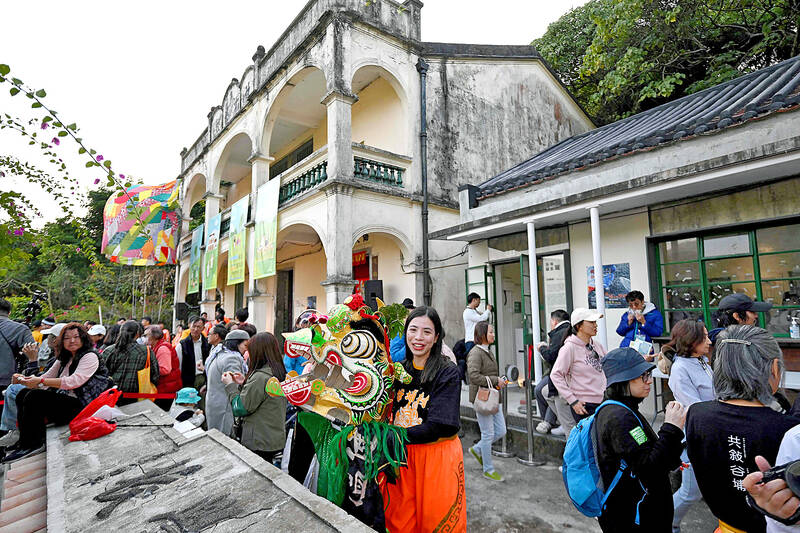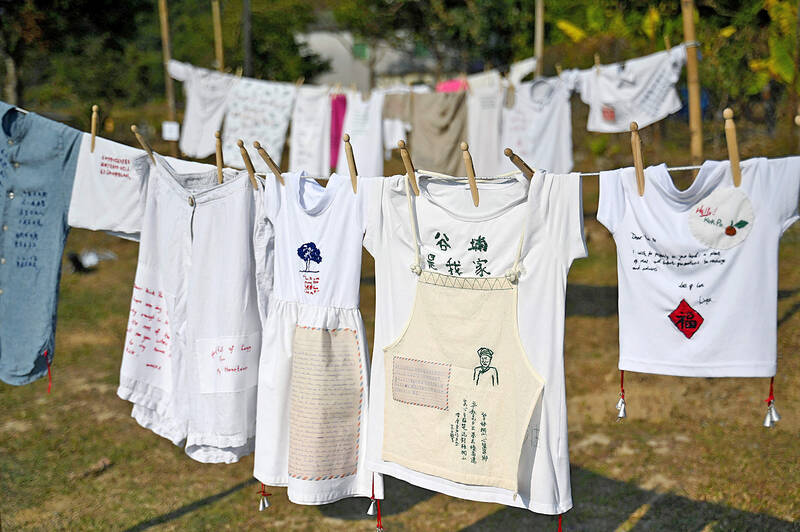Tourists in Hong Kong are flocking to the 300-year-old village of Kuk Po, whose decaying mansions and reed fields offer a respite from the former British colony’s famously frenetic pace.
The seaside village was once home to Hakka people from southern China, but was mostly abandoned in recent decades, even as gleaming high-rises sprang up in nearby Shenzhen across the Chinese border.
However, Hong Kong’s government is encouraging visitors to go off the beaten path and has loosened entry restrictions to the territory’s northernmost neighborhood of Sha Tau Kok — making it easier to visit Kuk Po via speedboat.

Photo: AFP
RUSTIC CHARM
On a recent weekend this month, tourists thronged to the village’s picturesque sights, surrounded on three sides by gentle valleys.
“When people talk about Hong Kong, it was about the skyline, the city area, the financial hub,” Singaporean exchange student Kevin Choy said.

Photo: AFP
“Very rarely do people talk about the countryside,” the 24-year-old said.
“This side of Hong Kong is something that I never imagined,” he added.
Lilian Lee, whose family has deep roots in Kuk Po, said her parents returned there during the COVID-19 pandemic to enjoy the charms of village life — a choice that may resonate with stressed-out city-dwellers.
In 2022, she started welcoming visitors into her family’s two-story ancestral home — built nearly a century ago.
“The world outside is very stressful and chaotic ... but here you can relax and be at ease,” the 30-year-old said.
“This is a beautiful environment that should be treasured [and] our family came together to share this place with more people,” she said.
The Hakka — whose name means “guest people” — are known for their long history of migration and transformed Kuk Po into a market town, though its numbers dwindled after Hong Kong urbanized in the 1960s.
Tour organizer Paul Chan said sustainable tourism was driving more tourists to visit the near-deserted town.
“When the public is interested, it creates a virtuous cycle: for houses and monuments to be restored, and cultures to be revived,” Chan said.
ECO-TOURS
The Hong Kong government hopes eco-tours can promote nature conservation while generating cash for the territory. Kuk Po was among the rural townships listed in a tourism policy blueprint last month.
However, despite the uptick in interest, Lee said it was difficult to financially sustain revitalization efforts that include tours, tasting events and workshops, and that she hoped the government would invest more in sustainable tourism.
“I hope the village will not turn into a tourist attraction solely for sightseeing, but rather to follow an educational approach,” she said.
“Many villages and their histories in Hong Kong are gradually disappearing... I hope these things can be passed on,” she said.

Australia has announced an agreement with the tiny Pacific nation Nauru enabling it to send hundreds of immigrants to the barren island. The deal affects more than 220 immigrants in Australia, including some convicted of serious crimes. Australian Minister of Home Affairs Tony Burke signed the memorandum of understanding on a visit to Nauru, the government said in a statement on Friday. “It contains undertakings for the proper treatment and long-term residence of people who have no legal right to stay in Australia, to be received in Nauru,” it said. “Australia will provide funding to underpin this arrangement and support Nauru’s long-term economic

‘NEO-NAZIS’: A minister described the rally as ‘spreading hate’ and ‘dividing our communities,’ adding that it had been organized and promoted by far-right groups Thousands of Australians joined anti-immigration rallies across the country yesterday that the center-left government condemned, saying they sought to spread hate and were linked to neo-Nazis. “March for Australia” rallies against immigration were held in Sydney, and other state capitals and regional centers, according to the group’s Web site. “Mass migration has torn at the bonds that held our communities together,” the Web site said. The group posted on X on Saturday that the rallies aimed to do “what the mainstream politicians never have the courage to do: demand an end to mass immigration.” The group also said it was concerned about culture,

ANGER: Unrest worsened after a taxi driver was killed by a police vehicle on Thursday, as protesters set alight government buildings across the nation Protests worsened overnight across major cities of Indonesia, far beyond the capital, Jakarta, as demonstrators defied Indonesian President Prabowo Subianto’s call for calm. The most serious unrest was seen in the eastern city of Makassar, while protests also unfolded in Bandung, Surabaya, Solo and Yogyakarta. By yesterday morning, crowds had dispersed in Jakarta. Troops patrolled the streets with tactical vehicles and helped civilians clear trash, although smoke was still rising in various protest sites. Three people died and five were injured in Makassar when protesters set fire to the regional parliament building during a plenary session on Friday evening, according to

STILL AFLOAT: Satellite images show that a Chinese ship damaged in a collision earlier this month was under repair on Hainan, but Beijing has not commented on the incident Australia, Canada and the Philippines on Wednesday deployed three warships and aircraft for drills against simulated aerial threats off a disputed South China Sea shoal where Chinese forces have used risky maneuvers to try to drive away Manila’s aircraft and ships. The Philippine military said the naval drills east of Scarborough Shoal (Huangyan Island, 黃岩島) were concluded safely, and it did not mention any encounter with China’s coast guard, navy or suspected militia ships, which have been closely guarding the uninhabited fishing atoll off northwestern Philippines for years. Chinese officials did not immediately issue any comment on the naval drills, but they